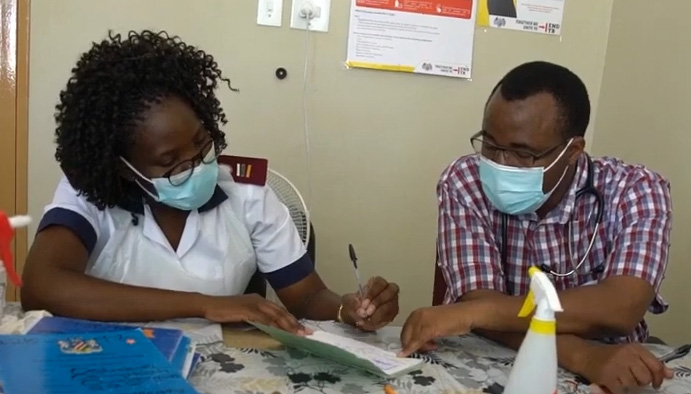A growing body of research shows Project ECHO, a global telementoring organization dedicated to sharing knowledge in underserved areas, can be a critical tool in Namibia’s fight against HIV/AIDS.
HIV/AIDS is the leading cause of death among adults and in children under 5 in the southwest African nation, with an estimated 3,052 deaths last year, according to a U.S. President’s Emergency Plan for AIDS Relief report.
In recent years, the Namibian Ministry of Health and Social Services has ramped up efforts to control the epidemic using the ECHO Model of disseminating best practices and up-to-date information, but the COVID-19 pandemic threatened the country’s progress.
COVID-19 Put HIV Progress at Risk
The ECHO model proved to be a crucial asset during the public health crisis because of its ability to scale and adapt to different diseases, geographies and cultures. The Ministry of Health used the established ECHO infrastructure to quickly adapt HIV treatments during COVID-19 lockdowns, according to research in the Centers for Disease Control and Prevention’s Morbidity and Mortality Weekly Report.
The Ministry of Health used ECHO to share national guidance including prioritizing life-saving HIV treatments, limiting in-person contact with patients and coordinating ongoing care despite COVID restrictions. That guidance was quickly and effectively shared with 2,068 Namibian health care providers in one month.
“Because all major district hospitals and high-volume health care centers in the country use the ECHO platform, rapid communication and telementoring across all regions was possible, despite travel restrictions,” authors of the CDC article wrote.
This isn’t the first time research has demonstrated ECHO’s lasting impact in Namibia’s fight against HIV/AIDS.
A study published in Human Resources for Health, a peer-reviewed public health journal, found the ECHO Model – originally aimed at expanding hepatitis C treatment in rural New Mexico – was successfully adapted for HIV care in Namibia. In 2015, with an escalating epidemic, Namibia turned to Project ECHO to mentor, train and retain more health care workers to meet the growing number of patients, launching the first HIV ECHO initiative in Africa.
A Proven Model for Retention, Confidence and Collaboration
The Ministry of Health launched ECHO programs across the country to teach nurses, physicians and pharmacists about HIV medications that reduce the risk of transmission, among other topics. As a result, health care professionals’ knowledge on HIV improved (17.8% overall), and providers collaborated with peers and asked questions, helping them feel less alone and more confident in their work.
“By helping achieve the goal of delivering the right knowledge to the right place at the right time for those who need it most, the Project ECHO model has proven to be a powerful tool for helping achieve successful decentralization of HIV clinical services across Namibia,” the study’s authors said.
By 2019, ECHO had served more than 140,000 people living with HIV in Namibia, according to the article.
“We were already comfortable with telementoring using the ECHO model, so COVID-19 did not slow us down,” said Leonard Bikinesi, one of the authors of the Human Resources for Health article. “Instead, the pandemic spurred us to work harder than ever to use ECHO to ensure all health care providers have the information they need to continue HIV services.”
Since 2003, Project ECHO’s telementoring model is being used to tackle the world’s greatest challenges in health care, education, journalism and more. Headquartered at The University of New Mexico Health Sciences Center in Albuquerque, N.M., Project ECHO is empowering local community providers to improve the well-being of people around the world. Join us today, in our mission to touch 1 billion lives by 2025.
Featured image description: Doctors in Namibia participate in a Project ECHO session, collaborating on HIV care and sharing clinical expertise as part of a national effort to expand access to treatment.

